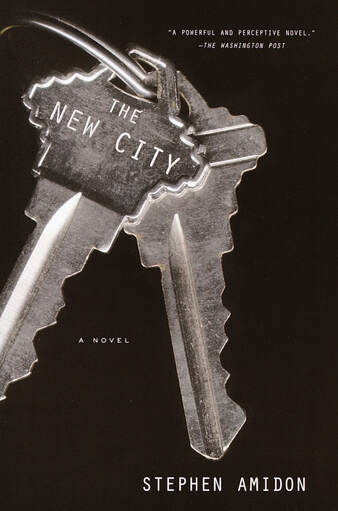THE NEW CITY
|
“MY FAVORITE NOVEL OF 2000 MUST BE STEPHEN AMIDON ’S “THE NEW CITY,” AN AMBITIOUS ATTEMPT TO UPDATE AMERICA’S LONG QUEST FOR THE GREAT GOOD PLACE. SET IN EAST COAST SUBURBIA, CIRCA 1975, THE BOOK BRIGHTLY REFLOATS THE WISHFUL IDEALISM THAT INFORMED THE POST-WATERGATE ERA, BUT IS WISELY BALLASTED WITH THOSE RECURRING THEMES OF COMPELLING FICTION: GREED, AMBITION AND LUST. THE ENDING IS HEARTBREAKING BUT TRUE-TO-LIFE, AND WE FINISH THE BOOK HAVING GAZED DEEPLY AND DARKLY INTO THE AMERICAN LOOKING GLASS.” COLIN HARRISON, THE HARTFORD COURANT |
About
Stephen Amidon's The New City takes aim at the suburban American dream and captures the real nightmare behind it.
It is 1973, the Vietnam War is winding down and the Senate Watergate hearings are heating up. But Newton, Maryland, is a model community, an enclave of harmony and prosperity. Through years of cunning legal maneuvering and smooth real-estate deals, the white lawyer Austin Swope has made the dream of this new city a reality. His best friend is Earl Wooten, the black master builder who raised Newton from its foundations. Their teenaged sons, Teddy and Joel, each the repository of his father's deepest hopes for the future, are inseparable buddies. But cracks begin to appear in this pristiine and meticulously planned community, and an innocent misunderstanding is about to set the two men who control its quiet streets on a fateful collision course.
It is 1973, the Vietnam War is winding down and the Senate Watergate hearings are heating up. But Newton, Maryland, is a model community, an enclave of harmony and prosperity. Through years of cunning legal maneuvering and smooth real-estate deals, the white lawyer Austin Swope has made the dream of this new city a reality. His best friend is Earl Wooten, the black master builder who raised Newton from its foundations. Their teenaged sons, Teddy and Joel, each the repository of his father's deepest hopes for the future, are inseparable buddies. But cracks begin to appear in this pristiine and meticulously planned community, and an innocent misunderstanding is about to set the two men who control its quiet streets on a fateful collision course.
Praise
“extraordinary…The most obvious comparison is with Tom Wolfe, although the novel is closer in texture to Dreiser’s An American Tragedy. Like his naturalist predecessor, Amidon explores the ways in which our motives are never quite our own; the sense that the random is constantly undermining whatever scripts we have tried to write for ourselves.”
Graham Caveney, The Independent
“Amidon’s book is an honest and searching look at the human relationships that are at the root of abstract categories like race and class and at the centre of often equally abstract communities, whether urban or suburban, real or imagined. It reminds us that while environments can be rigorously planned for maximum uplift, there is no accounting for human behaviour.”
Tom Vanderbilt, LA Times
“A Utopian thriller in which the best features of humanity are revealed as being uncomfortably close to the worst…This is an ambitious book, but Stephen Amidon is a clever enough writer — composed, elegant and confident — to realize his own intentions.” David Utterson, TLS
“Large, impressive, highly intelligent…in the best tradition of American realism that goes back at least to Dreiser, and includes also Sinclair Lewis, John O’Hara, John P. Marquand, the underrated Louis Auchinchloss and Updike at his best…very satisfying. It is a pleasure–and a relief–to read a novelist whose prose…is free from flourishes, decoration for cleverness’s sake, and self-admiration; a novelist who had the ability to tell a story and create convincing characters about whose fate one cares.” Alan Massie, The Scotsman
“A gloriously old-fashioned saga of ambition and betrayal, idealism and dismay…Amidon controls his intricate plot with great skill to provide a hugely gripping and satisfying read, full of astonishing set-pieces. His publishers are right to compare him to John Updike and Tom Wolfe. “ Mark Sanderson, Time Out
Graham Caveney, The Independent
“Amidon’s book is an honest and searching look at the human relationships that are at the root of abstract categories like race and class and at the centre of often equally abstract communities, whether urban or suburban, real or imagined. It reminds us that while environments can be rigorously planned for maximum uplift, there is no accounting for human behaviour.”
Tom Vanderbilt, LA Times
“A Utopian thriller in which the best features of humanity are revealed as being uncomfortably close to the worst…This is an ambitious book, but Stephen Amidon is a clever enough writer — composed, elegant and confident — to realize his own intentions.” David Utterson, TLS
“Large, impressive, highly intelligent…in the best tradition of American realism that goes back at least to Dreiser, and includes also Sinclair Lewis, John O’Hara, John P. Marquand, the underrated Louis Auchinchloss and Updike at his best…very satisfying. It is a pleasure–and a relief–to read a novelist whose prose…is free from flourishes, decoration for cleverness’s sake, and self-admiration; a novelist who had the ability to tell a story and create convincing characters about whose fate one cares.” Alan Massie, The Scotsman
“A gloriously old-fashioned saga of ambition and betrayal, idealism and dismay…Amidon controls his intricate plot with great skill to provide a hugely gripping and satisfying read, full of astonishing set-pieces. His publishers are right to compare him to John Updike and Tom Wolfe. “ Mark Sanderson, Time Out
Best books of the year include:
Sunday Times, Washington Post, LA Times, Uncut, Sunday Express, Baltimore City Paper, Hartford Courant, Ottakar's Booksellers.
Sunday Times, Washington Post, LA Times, Uncut, Sunday Express, Baltimore City Paper, Hartford Courant, Ottakar's Booksellers.
